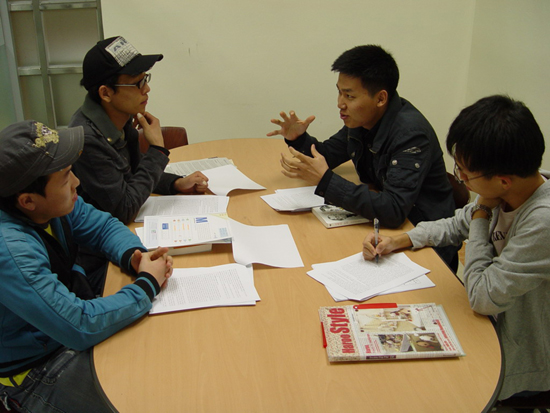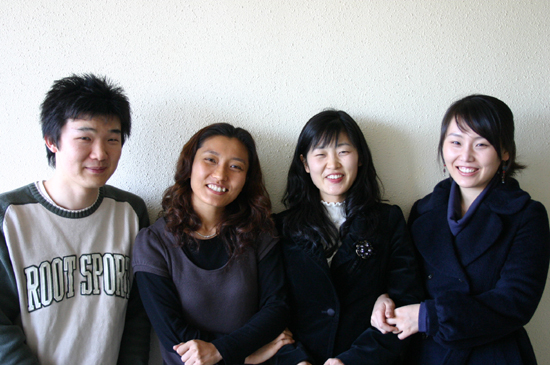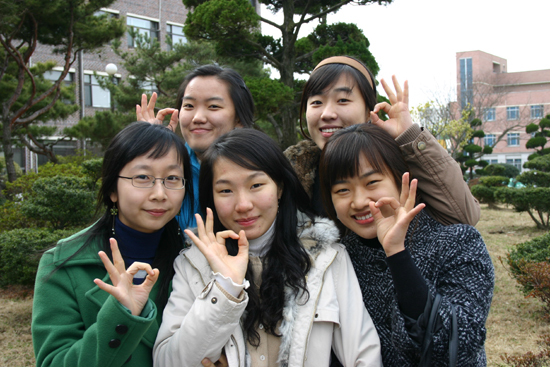#275. Into the Campus
“Hello CNUians!” Spring is coming and the weather is great for studying, isn’t it? If you made up your mind to study hard this semester why don’t you participate in the Aha! Learning Community program? The Education Development Research Institute (EDRI) has been conducting the program since the second semester of 2005.
Aha! Learning Community has four sub-programs; Gong-Bu-Il-Chon, which means first-degree relationship for studying, Tutoring, Yi-Mut-ggo seminar, which is to help freshmen to adapt to college life through meeting selected professors, and Deo na-ga which is a professors’ group for giving better lectures and striving for better teaching skills.
Of these, many students have participated especially in Gong-Bu-Il-Chon and Tutoring. Group numbers have been increased sharply from 47 to 438 over the last three semesters. It’s amazing! Want to know more? Let’s continue!
The Entire Programs of Aha! Learning Community
Aha! Learning Community aims to develop CNU-ians’ learning abilities in a creative, cooperative and challenging way. The EDRI wants all of CNU-ians to study passionately with the community members and to communicate to each other well in achieving their goals.

Furthermore, the institute also wants the students’ learning attitudes and passion to be spread to others university. So let’s take a deep look at the Community with priority given to Gong-Bu-Il-Chon and Tutoring program.
The Gong-Bu-Il-Chon is divided into three sub-programs as follows: one is for students who take the same lecture and another is for students who have common topics to study together. The other is for graduate students.
All Groups should consist of at least four undergraduate students but more than five is difficult for the EDRI to permit. Tutoring program is based on a certain subject that students choose and is subdivided into Peer Tutoring and Freshmen Tutoring.
The former is made up of one graduate tutor and five or so undergraduate students. The latter also consists of one tutor, junior or senior who got A or A+ in a certain subject and five or more freshmen. These two programs are open to various academic disciplines and designed for CNU-ians including foreigner students.
On joining Gong-Bu-Il-Chon and/or the Tutoring program, several rules are to be obeyed and EDRI members keep a close eye on study groups. Certain students among those who have already joined Aha! Learning Community, felt too burdened by having to submit learning reports.
Every group should meet for study at least once a week and submit a weekly report about their meeting and learning on the EDRI’s homepage. Additionally they should meet their relevant professor twice or so a semester. Observation assessment is also involved. When groups study, the EDRI member will visit them and see what they do.
But this should not cause pressure because the EDRI just wants to check how well a group is going and on communications between its members. Park Sun-hee who is working at the Learning Support Division of EDRI said that the observation assessment is the most important part in this program because groups and EDRI can communicate freely and effectively face to face.
“Do you think these rules are a kind of a burden? They may prevent a person from starting the program.” I asked her. She replied “All CNU-ians have to do is to have a passionate spirit.”
However, Yeosu campus students also have this program but there is no-one to perform the observation assessment. Park Sun-hee said it was not easy to find a proper assistant who can communicate with students there and also attend meetings frequently in Gwangju. According to her, the EDRI has kept searching for an assistant for Yeosu campus, so they hope to find one soon to encourage Yeosu campus students.
New Advanced rules from now on
Some changes or advances for a more efficient operation of Aha! Learning Community have taken place. The first one is introducing an on-line application program. Prior to this, students submitted their application forms to the EDRI directly or by e-mail.
Now they can apply with a specialized on-line system. Students wanting to participate in the program can apply per semester, twice a year, usually after registering for courses. Tips! A well-organized application form with passion has a high possibility of being accepted. According to the EDRI, 400 groups can join this semester.

The observation assessment has also changed. EDRI member visited groups without any notice and used not keep in touch with any Gong-Bu-Il-Chon groups. This produced misunderstandings about meeting days and times between the members and study groups.
Sometimes students changed their meeting time or place but the EDRI couldn’t be notified unless the observer called the students. So from this semester on the EDRI will make an appointment with learning groups. You may think that it’s not suitable to notify groups because some groups may just pretend to study hard.
However, it’s impossible to avoid this situation. Once the EDRI members watch groups studying together, they can notice whether they have been studying hard or not.
A chance to participate in a Cultural Field Trip program which is held by International Center (IC) exists. This program operated independently from the EDRI. From this semester on, the IC has linked up Aha! Learning Community and allocates places for 30 groups a year to participate in the program. It is planned to select participant groups in April. What nice changes! Participants are given two chances.
CNU-ians! It’s 2007. As mentioned above, you might make up your mind to study hard this year and set your own goal. To achieve it, why don’t you participate in Aha! Learning Community? You can come on in leaps and bounds this year!
<Interview>
Chonnam Tribune met the ‘Returned Feedback’ team members. Like the day, their smiles were sunny and bright. The team name is so interesting. They said it was from learning reporters’ comments that they received. Let’s listen to their story!

-The Returned Feedback team won the prize as the excellent Gong-Bu-Il-Chon group of 2006
-Leader- Kwon Soon-yeong
-Group members- Kim Juna-a, Park- Jin-sil, Yoon Sang-ah, Shin Kyoung-ah
-All of them are sophomores, College of Ecology, Dept. of Food and Nutrition.
Q. How did you come to participate in Gong-Bu-Il-Chon?
Jung-a: Kyoung-ah suggested we to study together. It was actually our second time to join the Gong-Bu-Il-Chon program. We took almost the lessons in our major field last year and felt it was hard to study them by ourselves and get good grades, so we joined the program.
Q. What was the most impressive aspect while participating in this program?
Kyoung-ah: It was the EDRI members’ comments on our reports. They commented on every report. We were really impressed and felt they had taken care of us. Whenever we met them off-line, they recognized us and greeted us. Through our uploaded photos and observation assessments, they could recognize us. I think it is hard to memorize all group members. It was surprising and helpful.
Soon-yeong: I think so. Especially when we felt exhausted like at exam times, we were cheered up by their comments.
Q. Would you like to say something to CNU-ians?
Sang-ah: Some students join Gong-Bu-Il-Chon program only to get financial support. But if you start like that, you will surely fail. I recommend to CNU-ians to participate in the program with some of your own rules.
Jung-a: Participating in this program, you can become closer to your friends, seniors and professors. We felt everyone around us praised us. We, therefore feel we advanced a lot and now strive to set higher goals for ourselves.
Kyoung-ah: Yes, also in my case I realized how to study and felt it was effective study.

